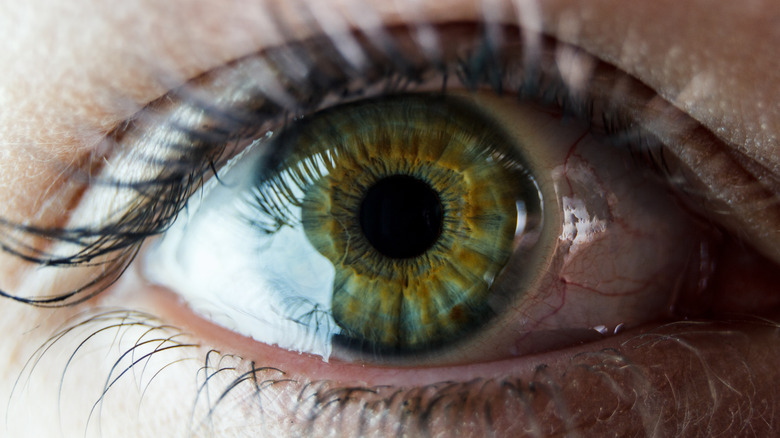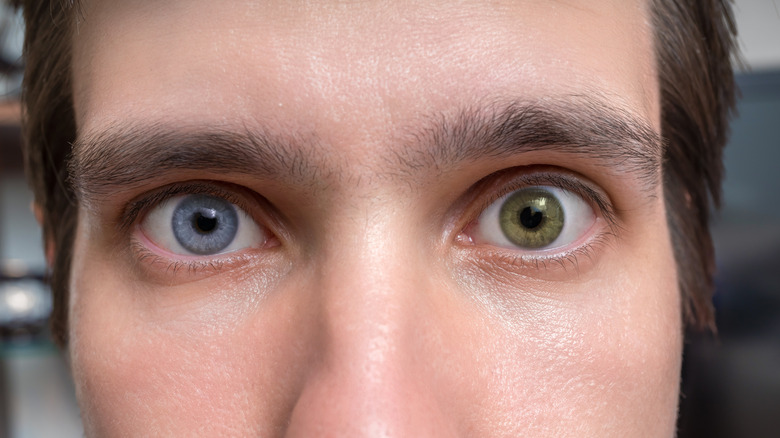Is It Possible For Your Eyes To Change Color?
You've always had blue eyes —when you were a baby, a child, a teen, and now as an adult. But recently someone looked into your eyes and said they were actually more green. You ran to a mirror and, by George, they did look green.
Now you're wondering if your eyes actually changed color. Or was it a kind of optical illusion?
Chances are your eyes are still blue. Changes in eye color are rare, according to the American Academy of Ophthalmology (AAO).
"Some studies suggest that eye color can change a tad with age, but for most people, eye color is fixed after the first year of life," Ivan Schwab, a professor of ophthalmology at the University of California and clinical spokesman for the AAO, told the Wall Street Journal.
Most non-Hispanic Caucasian babies are born with dark blue or slate-gray eyes, while almost all African-American, Hispanic, and Asian babies are born with dark eyes. In the first year, the eye color of Caucasian babies may change several times before settling on a permanent (often darker) shade. Eyes that were brown or dark at birth might change shade slightly during the first year (per What To Expect).
After that, your eye color is with you for life, although there are a few exceptions.
Problems with the iris may cause color change
What gives eyes their color? That's the iris, a muscle that enlarges and contracts the pupil size, to let in more or less light. The front layer of the iris, called the stroma, contains cells that produce melanin and fibers that reflect and scatter light outward, giving eyes their color (via the Wall Street Journal).
Changes in eye color might be based on something that's happening in the iris, according to the AAO. The underlying cause might be relatively harmless and somewhat common, such as iris freckles — small brown spots on the iris often related to sun exposure. Another cause of eye color change are iris nevi, which are larger freckles on the eye that look like moles. These are also usually harmless, although they may lead to a higher risk for cancer.
There are other, more serious, problems with the iris that can lead to color change, including Lisch nodules, growths on the iris that are associated with neurofibromatosis; Horner's syndrome, the result of a stroke, tumor, or injury that affects one side of the face and can lead to uneven pupil size and depigmentation of the iris; and uveitis, an inflammation of the middle layer of the eyeball that requires immediate medical attention.
With heterochromia, when a person's eyes are two different colors, the cause can be genetic or related to trauma, which could loosen some of the cells responsible for producing melanin, making the eye appear darker or lighter.
Other causes of color change
Eye color may change slightly during puberty or pregnancy, when pigments tend to darken, says Dr. Schwab. Eye color may also change with age, which happens in 10 to 15% of Caucasian people who have lighter eye colors, according to All About Vision. Medicines for glaucoma can cause a permanent eye color change, usually to a darker shade (per the AAO).
Other eye color changes may simply be an optical illusion. When you look into a person's eyes, what you see is influenced by the colors around him, as well as the colors he is wearing. For instance, if a person has green eyes and is wearing clothes in a similar color, the color of the clothing will enhance his green eyes. On the other hand, if he is wearing a shirt in a complementary color (red on the color wheel), his eyes may appear to be a different color.
Emotions can also have a color change effect. During extreme emotions, such as grief or joy, the pupil changes in size, and the pigments in the iris compress or spread apart, affecting the eye color a bit. Eye color may also appear to change when a person is angry and has red, dilated blood vessels in his eyes — if his eyes are green, the contrast between the iris and the blood vessels may make his eyes look greener.
Because a change in eye color after infancy is so rare, any color shift that is dramatic or happens only in one eye should be checked by an ophthalmologist.



